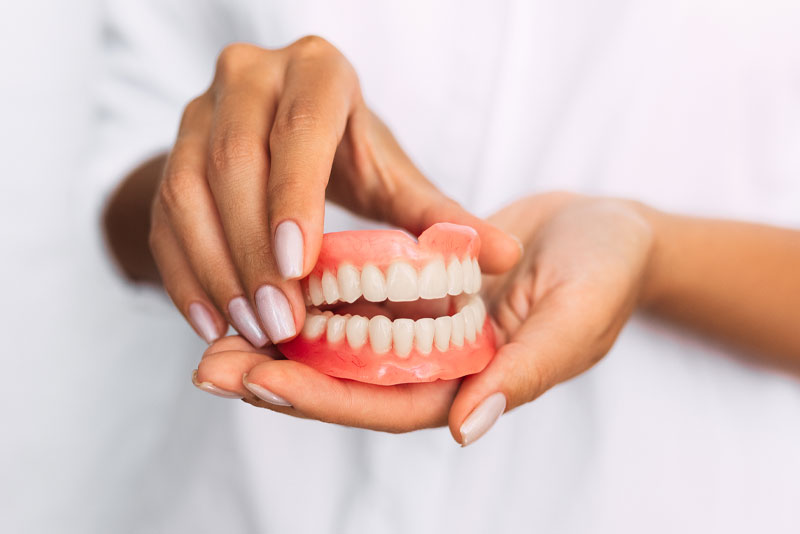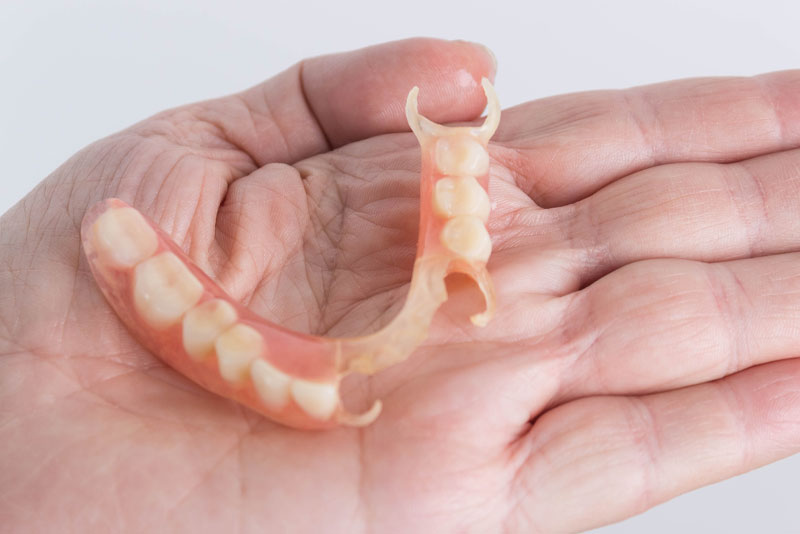Living with one or more missing teeth is tough. Smiling openly is difficult, and you may even find yourself smiling less and less. Without teeth, you may begin to lose hope in ever looking attractive or feeling confident again. If you’re missing several or all your teeth, contact Dr. Jayson Tabor and our experienced team at Tabor Dental Associates to learn about partial and full dentures in Hendersonville, TN! A denture can improve your chewing ability and speech by being digitally customized to your mouth. These teeth replacements also provide support for facial muscles and can greatly enhance your facial appearance and smile. Most importantly, our partials and dentures can give you a reason to smile once again!
Dentures are a time-tested, economical solution to tooth loss.
We provide two types of dentures in Hendersonville, TN, depending on the number of teeth that need to be replaced.

Candidates for complete dentures have lost most or all of their teeth. Complete dentures replace all the teeth in a top or bottom row (in your upper or lower jaw) or both. Complete dentures are also called “traditional” or “conventional” dentures. With traditional dentures, you come back for another appointment to have them put in place. If you qualify for immediate dentures, they can be inserted immediately after the removal of your remaining teeth. To make this possible, we’ll take measurements and make models of your jaws during a preliminary visit. The great advantage of immediate dentures is that you won’t have to be without teeth during your healing period!

A partial denture is suitable for those who have a certain number of natural teeth remaining. A partial denture fills in the spaces created by missing teeth and prevents other teeth from changing position. You can choose removable partial dentures, which consist of replacement teeth attached to a pink or gum-colored base. These are connected by a metal framework and attach to your natural teeth with metal clasps or devices called precision attachments. Another option is an overdenture, which is a removable denture that fits over a small number of remaining natural teeth or implants. The natural teeth must be prepared to provide stability and support for the denture. The near-invisible precision attachments generally look better than metal clasps. The crowns on your natural teeth may improve the fit of a removable partial denture, too.

Your dentures process will take about a month, a few appointments, and generally follows a basic structure, though your restoration is individualized to your needs. Our goal is to provide natural-looking dentures that cannot be distinguished as “false teeth” and fit perfectly along your unique gumline. At your first appointment, we’ll make an initial diagnosis, and you’ll get digital impressions with our sophisticated iTero® intraoral scanner. Unlike goopy paste impressions of the past, these digital renderings of your mouth are significantly more comfortable and precise. Your denture will fit more securely and look more natural!
Next, a wax bite is made to determine vertical dimensions and proper jaw position. Then, you’ll receive a physical “try-in” to assess the color, shape and fit of your final dentures. Our state-of-the-art partner dental lab will then create your dentures, and you’ll return to our office for a final fitting when they’re complete. We’ll work hard to make sure your dentures are the right color and shape, so your smile looks beautiful again!
Dentures will take a short amount of time to get used to. Read on to learn more about dentures and the changes they bring.
For the first few weeks, a new denture may feel awkward or bulky. However, your mouth will eventually become accustomed to wearing it. Start by eating soft foods that are cut into small pieces. Chew on both sides of the mouth to keep even pressure on the denture. Avoid sticky or hard foods, including gum. Inserting and removing the denture will require some practice. Your denture should easily fit into place. Never force a partial denture into position by biting down. This could bend or break the clasps.
At first, you may be asked to wear your dentures all the time. Although this may be temporarily uncomfortable, it is the quickest way to identify those denture parts that may need adjustment.
If the denture puts too much pressure on a particular area, that spot will become sore. Your denture can be adjusted to fit more comfortably. After adjusting, you may need to take a denture out of your mouth before going to bed and replace it in the morning.
Hand soap or mild dishwashing liquid is acceptable for cleaning dentures. Other types of household cleaners and many kinds of toothpaste are too abrasive and should not be used for cleaning dentures. For best results, look for denture cleansers with the American Dental Association (ADA) Seal of Acceptance. It’s best to stand over a folded towel or a sink of water when handling your denture, just in case you accidentally drop it. Brush the denture (preferably with a denture brush) daily to remove food deposits and plaque and to keep it from becoming permanently stained. Avoid using a brush with hard bristles, which can damage the denture.
A denture could lose its proper shape if it is not kept moist. At night, the denture should be placed in a soaking solution or water. However, if the appliance has metal attachments, they could be tarnished if placed in a soaking solution.
Even with full dentures, continue to take good care of your mouth. Every morning brush your gums, tongue, and palate with a soft-bristled brush before you put in your dentures. This removes plaque and stimulates circulation in the mouth. With partial dentures, pay special attention to cleaning teeth that fit under a denture’s metal clasps. Plaque that becomes trapped under the clasps will increase the risk of tooth decay. Selecting a balanced diet for proper nutrition is also important for maintaining a healthy mouth.
As you age, your mouth naturally changes, which can affect the fit of the denture. Your bone and gum ridges can recede or shrink, resulting in a loose-fitting denture. The loose fit can cause various problems, including sores or infections. Dentures that do not fit properly should be adjusted. Avoid using a do-it-yourself kit to adjust your dentures, as this can damage the appliance beyond repair. Store-bought glues often contain harmful chemicals and should not be used on a denture.
In many cases, dentists can make necessary adjustments or repairs, often on the same day, or send it to a dental laboratory. Please call immediately if your denture breaks, cracks, chips, has a loose tooth, or no longer fits properly. After some time, dentures often need to be relined, re-based, or re-made due to normal wear, which your dentist can complete. Dentures may also need to be replaced if they become loose or if the teeth show signs of significant wear.
Eating with dentures may take practice. Start with soft foods cut into small pieces. Chew slowly while using both sides of your mouth at the same time to prevent the dentures from tipping. As you become accustomed to chewing, add other foods until you return to your normal diet. Continue to chew food using both sides of the mouth at the same time. Be cautious with hot or hard foods and sharp-edged bones or shells.
Some people worry about how dentures will affect their speech. Pronouncing certain words may require practice. Reading out loud and repeating troublesome words will help. If your dentures click while you’re talking, speak more slowly. You may find that your dentures occasionally slip when you laugh, cough, or smile. Reposition the dentures by gently biting down and swallowing. If a speaking problem persists, call our office.
I understand the information disclosed in this form may be subject to re-disclosure and may no longer be protected by HIPAA privacy regulations and the HITECH Act.
I understand the information disclosed in this form may be subject to re-disclosure and may no longer be protected by HIPAA privacy regulations and the HITECH Act.
